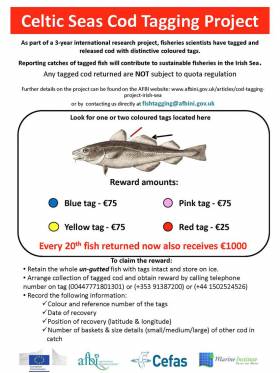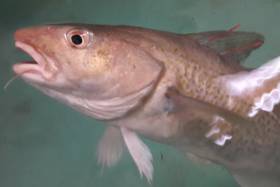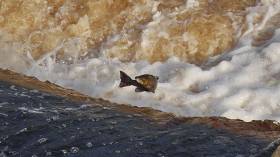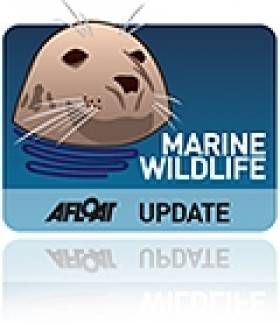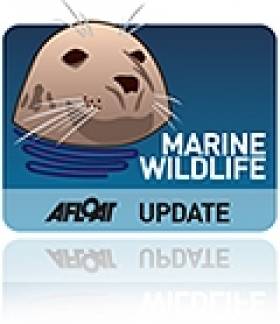Displaying items by tag: tagging
Views Sought on Ways to Improve Wild Salmon & Sea Trout Tagging Scheme
Inland Fisheries Ireland (IFI) has launched a public consultation on the future management of the Wild Salmon and Sea Trout Tagging Scheme.
The State agency with responsibility for the protection and conservation of freshwater fish and habitats is encouraging anyone with an interest in the area to submit their views on how the tagging system, which started in 2001, can be improved and modernised.
It is especially keen to hear from salmon and sea trout anglers, angling clubs, commercial fishermen and those businesses that distribute salmon and sea trout licences, such as fishing tackle shops.
The Wild Salmon and Sea Trout Tagging Scheme was set up 20 years ago to record the issuing of wild salmon and sea trout licences, gill tags and logbooks to both recreational anglers and commercial fishermen and to process details of fish catches on a database for further analysis.
It was part of a series of measures introduced to help with the management and conservation of Ireland’s wild salmon and sea trout populations, which have been in decline.
Figures from the 2020 Wild Salmon and Sea Trout Statistics Report show that 14,138 salmon and sea trout licences were sold to recreational anglers in the state last year, which were a mixture of virtual licences sold online and hard copy licences sold over the counter in shops. In addition, 78 public commercial licences were made available to commercial fishermen in 2020.
IFI is now carrying out a review of the whole tagging system, to see how it can be made more user-friendly in the future and to ensure that it can provide the agency with real-time, accurate data to assist with the protection, management and conservation of wild salmon and sea trout.
Suzanne Campion, IFI’s head of business development, said:“The Wild Salmon and Sea Trout Tagging Scheme was first introduced two decades ago and since then, we’ve seen a seismic shift towards buying and selling online, with many technological advances along the way that we’d like to harness.
“As we’re undertaking a review of the tagging system, we see this as the perfect opportunity for the public, especially those involved in the angling sector, to have their say on the management of how licences, tags and logbooks are issued and distributed in the future. In other words, how can Inland Fisheries Ireland make the tagging system as user-friendly as possible in the future and a better service for all?”
The public consultation for the Wild Salmon and Sea Trout Tagging Scheme closes at 5pm on Wednesday 1 December. Submissions can be made via a short online survey.
Alternatively, written submissions can be emailed to [email protected] or posted to Wild Salmon & Sea Trout Tagging Scheme Consultation, Inland Fisheries Ireland, 3044 Lake Drive, Citywest Business Campus, Dublin 24, D24 CK66.
Christmas Bonus In Rewards For Reporting Tagged Irish Sea Cod
#Fishing - Northern Ireland’s Agri-Food and Biosciences Institute reminds that the rewards for reporting tagged Irish Sea cod have been increased.
Earlier this year it was reported that the project would award €25 for every cod captured with a red tag, and €75 for cod with a blue, pink or yellow tag.
But now every 20th fish returned to the Celtic Seas Cod Tagging Project will net an additional €1,000 bonus.
To claim the reward, fishermen must retain the whole un-gutted fish with tags intact and store it on ice.
Collection of tagged cod and the related award can be arrived by calling the number on the tag or contacting +353 91387200 (in ROI) or +44 1502524526 (in UK).
Claimants must also be sure to also record the following details:
- Colour and reference number of the tags.
- Date of recovery.
- Position of recovery (latitude and longitude).
- Number of baskets and size details (small, medium or large) of other cod in the catch.
As previously reported on Afloat.ie, the Irish fishing fleet’s quota for cod and other whitefish will substantially increase for 2018 after a period of sustained recovery.
Rewards For Capture Of Tagged Irish Sea Cod
#IrishSeaCod - The Marine Institute is encouraging the fishing industry and recreational sea anglers alike to report the capture of tagged cod in the Irish Sea and claim a monetary reward.
Tagging cod in the Irish Sea will enable research agencies in the Ireland the UK to develop a better understanding of cod mortality, abundance, distribution and movement patterns within the Irish Sea and surrounding areas.
Emma White from the Fisheries Ecosystem Advisory Service at the Marine Institute said that with a low population of cod in the Irish Sea, it is vital that this stock is investigated.
:A huge effort will be made to tag several thousand cod in the Irish Sea over the next three years,” said White. “Any reports of the tagged cod will provide useful information to help us better understand the current behaviour of the fish and any factors that may have affected the cod stock.
“Our collaboration with science and industry partners is essential to this project, and together we can build our knowledge and share insights to assist in the recovery of this cod stock in the Irish Sea.”
The project will award €25 for cod captured with a red tag, and €75 for cod with a blue, yellow or pink tag. The cod must be stored whole and ungutted on ice, with the tag in place. The date and location (longitude and latitude) of capture, length of the fish, tag colour and its number should also be recorded.
Tagged cod should be reported to Emma White at the Marine Institute at 091 387 200 or [email protected]. The Marine Institute will organise the collection of tagged cod captured in Ireland.
Cod in the Irish Sea have substantially declined in the last decades. Although the European Commission established measures to aid recovery in 2000, the stock has not responded as expected, and the population of cod in the Irish Sea remains low in 2017.
This three-year project is funded by the European Commission and is a partnership between three research agencies: Marine Institute (Ireland), Agri-Food and Biosciences institute (Northern Ireland) and Cefas, the Centre for Environment, Fisheries and Aquaculture Science (United Kingdom).
More information on the Irish Sea Cod Tagging Project can be found HERE.
Minister Announces New Sea Trout Tagging Scheme & Conservation Measures
#Angling - Sean Kyne TD, Minister of State at the Department of Communications, Climate Action and Environment, has given statutory notice of his intention to make the Wild Salmon and Sea Trout Tagging Scheme Regulations 2016 to provide for the management of the wild salmon and sea trout fishery by Inland Fisheries Ireland from 1 January 2017.
A copy of the draft regulations is available from the department website and and is also open for public inspection at the offices of the department in Cavan and at the offices of Inland Fisheries Ireland.
Any person may submit observations or objections to the draft regulations at any time during the period of 30 days concluding on 11 December 2016 either by e-mail to [email protected] or to the following address:
Inland Fisheries Division,
Department of Communications, Climate Action and Environment,
Elm House,
Earlsvale Road,
Cavan Town
H12 A8H7
Ireland
Tel: 01 6783071 / Lo-call 1890 449 900 Extension 3071
All submissions received will be published on the department's website following the conclusion of the consultation period.
Call For Anglers To Support Bass Conservation
#Angling - Inland Fisheries Ireland (IFI) has issued an appeal to bass anglers preparing for the season ahead to get involved in collecting information on bass in Irish waters for the National Bass Programme (NBP).
The programme was established by IFI to collect data on bass to provide scientific advice to support management and conservation of Ireland’s bass resource.
Bass anglers, as citizen scientists, have been collecting information for the NBP since 2013, thereby supporting bass stock assessment and increased understanding of the biology and ecology of bass in Irish waters.
To date, over 750 bass have been tagged and 3,000 adult bass scale samples have been collected. Scales are used to determine the age and growth rate of bass, while tagging provides information on migrations and habitat use.
The likelihood of additional recaptures is increasing with greater numbers of tagged fish at sea. Tagging results so far have shown that bass were recaptured generally within a few kilometres of their original capture site but some have travelled up to 38km. Time at liberty has ranged from three to 298 days.
By checking all bass for tags and reporting recaptures, anglers will help to discover additional information regarding movements of Irish bass.
IFI head of research and development Dr Cathal Gallagher said: “Ireland has always been a pioneer in terms of bass conservation and is showing progressive thinking in bass management by using the expert knowledge of anglers to collect information that would otherwise not be obtainable. We call on anybody interested in promoting bass conservation to contact IFI for information on how to get involved. All support is much appreciated.
“If you catch a bass with a yellow tag, or a fouled tag, please don’t remove it from the fish. Simply clean the tag and note the tag code (eg B-00001). If possible take the length and weight of the fish, and five scales from behind the pectoral fin, before you release the fish alive.
"Please send us the details, along with the date and location and your name and phone number by email or call IFI on 01-8842600. Information on the original bass tagging location and date will be provided to everybody who reports details to the IFI.”
IFI chief executive Dr Ciaran Byrne added: “Bass is an extremely important and valuable marine sport angling species in Ireland. It is a particularly valuable national resource, contributing €71 million to the Irish economy annually and supporting over 1,200 jobs nationally.
"Bass is an angling-only species so it is important that anglers, as guardians and custodians of this iconic sportfish, contribute information to support conservation orientated management.
"Some anglers are using voluntary logbooks to provide information on catches, angling effort, fish sizes and methods used. Scale sampling packs and logbooks are available from IFI and feedback on scales received will be provided to individual anglers outlining fish age, the year it was spawned and its growth rate.”
IFI has a dedicated email address at [email protected] to enable members of the public to report details on caught bass or to request information on how to support the NBP.
For more information, visit www.fisheriesireland.ie or call IFI at 01 884 2600 during office hours.
Draft Wild Salmon & Sea Trout Tagging Regulations Open For Consultation
#Angling - Minister of State at the Department of Communications, Energy and Natural Resources Joe McHugh has given statutory notice of his intention to make the Wild Salmon and Sea Trout Tagging Scheme Regulations 2015.
The new Statutory Instrument will provide for the management of the wild salmon and sea trout fishery by Inland Fisheries Ireland from 1 January 2016.
A copy of the draft regulations is available online and is open for public inspection at the offices of the department in Cavan and also at the offices of Inland Fisheries Ireland.
Any person may submit observations or objections to the draft regulations at any time during the period of 30 days concluding on 10 December 2015 to
Inland Fisheries Division,
Department of Communications Energy and Natural Resources,
Elm House,
Earlsvale Road,
Cavan Town,
H12 A8H7,
Ireland
or by e-mail to [email protected].
All submissions received will be published on the department's website following the conclusion of the consultation period.
For more call 01 678 2117 or Lo-call 1890 44 99 00 (Extension). Rates charged may vary between service providers.
Video of Basking Shark Tagging
Cork-based boat charter firm Whale of a Time has posted video on its YouTube channel of the Irish Whale and Dolphin Group (IWDG) tagging a basking shark from its boat Mischief:
Apart from whales, basking sharks are the largest species of marine wildlife to frequent Irish waters.
Watch Out For Tagged Seals
The Irish Seal Sanctuary (ISS) has put out a call for observers to look out for tagged seals.
Following the news that a seal pup rescued and tagged by the ISS was discovered in Wales, the sanctuary is looking to build a better picture of what becomes of its seals once released back into the wild.
Observers are asked to report on the condition of any seals tagged on a hind flipper with an orange tage (for grey seals) or a yellow tag (for common seals) and with the code A4 written on one side.
The ISS hopes that this information will give a clearer idea of how rescued seals readjust to life in the open water, and how they interact with wild seals or with people in Ireland's harbours.
Any relevant information can be forwarded by e-mail to [email protected] or [email protected]



























